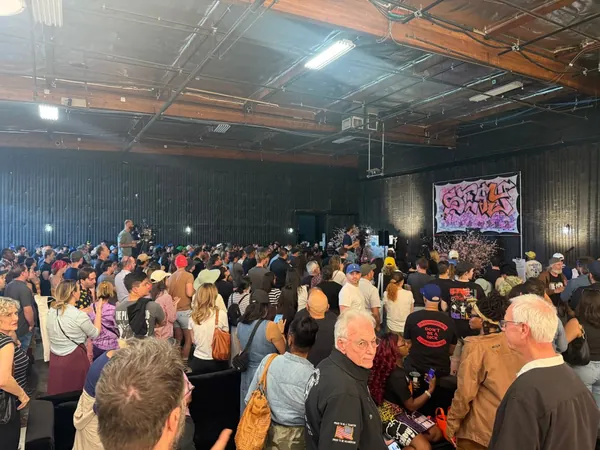
Tensions Rise as Israel's Security Cabinet Faces Cease-Fire Vote Amid Hostage Crisis and Ongoing Strikes
2025-01-17
Author: Ying
Overview of the Situation
In a high-stakes situation, the political future of a cease-fire deal in Gaza hangs in the balance as Israeli Prime Minister Benjamin Netanyahu prepares for a critical vote by his Security Cabinet. According to Netanyahu’s office, the agreement, brokered by international mediators, could come into effect as early as Sunday—pending the approval of Israeli ministers. The deal includes the release of hostages held by Hamas, with expectations for this release to coincide with the proposed cease-fire.
International Involvement
U.S. Secretary of State Antony J. Blinken expressed confidence in the plan, affirming that it should proceed as scheduled. The cease-fire not only aims to allow the return of hostages but also includes the contentious release of Palestinian prisoners detained in Israel, a point that has ignited fierce debate within Israel’s political landscape.
Domestic Political Tensions
Among the most vocal opponents is Itamar Ben-Gvir, Israel’s hard-line national security minister. He has threatened to withdraw his party from the coalition government if the cease-fire proposal is approved, asserting that such an agreement would effectively enable Hamas to maintain its power in Gaza. While this threat adds pressure to Netanyahu, it is indicative of a broader struggle within the Israeli political sphere, where multiple factions have differing views on how to address the ongoing conflict.
Escalating Violence
In the backdrop of these negotiations, deadly attacks in Gaza have escalated, with reports indicating that Israeli strikes have resulted in the deaths of over 100 individuals since the cease-fire discussions began. The Israeli military has defended its actions, stating that efforts were made to minimize civilian casualties amid ongoing bombardments, a narrative that has drawn skepticism from various international observers.
Conflict Background
The conflict has ramped up dramatically since Hamas launched a surprise attack on Israel on October 7, 2023, igniting a war that has claimed tens of thousands of lives, predominantly among Palestinians in Gaza, and displaced millions seeking refuge from relentless airstrikes.
U.S. Political Climate and Efforts
As pressure mounts, both Netanyahu and Biden have had to navigate a complex political climate. Biden, in a recent interview, reiterated his commitment to Israel while also stressing the importance of safeguarding Palestinian civilian lives. He noted that he had advised Netanyahu to actively consider Palestinian concerns in his military strategies. This push for humanitarian considerations comes against a backdrop of ongoing criticism aimed at Biden for the U.S.'s support of Israel's military operations, which some argue have been excessively aggressive.
Bipartisan Interest in Resolution
Adding to the complexity of the situation, Biden and incoming President Donald J. Trump have coordinated efforts to solidify an agreement before Trump’s inauguration, reflecting significant bipartisan interest in resolving the conflict. In recent remarks, Trump expressed urgency in finalizing the cease-fire deal, enhancing the stakes as tensions escalate on the ground.
Domestic Protests
The call for a cease-fire has also sparked domestic unrest, with protests erupting in Jerusalem. Demonstrators, some reportedly from the families of hostages, expressed their outrage against both the stalling of negotiations and the ongoing violence, leading to clashes with police as frustrations boiled over.
Media Scrutiny of U.S. Officials
Amid this chaos, U.S. officials, including Blinken, faced heightened scrutiny in press conferences. His press appearances have been punctuated by protests and critical questions from journalists, indicating mounting discontent regarding the U.S. stance on the conflict. Blinken has attempted to defend the government’s position while explaining the complexities of the situation, insisting that Hamas's tactics, including using civilian areas for military purposes, complicate the U.S. and Israeli response mechanisms.
Conclusion
As the Security Cabinet prepares for its crucial vote, both the immediate future of the cease-fire agreement and the long-term dynamics of the Israeli-Palestinian conflict remain uncertain. With pressure from both domestic factions and international observers, Netanyahu's decision will have far-reaching implications, not just for hostages and civilian casualties, but for the political landscape of Israel and the broader region.





 Brasil (PT)
Brasil (PT)
 Canada (EN)
Canada (EN)
 Chile (ES)
Chile (ES)
 Česko (CS)
Česko (CS)
 대한민국 (KO)
대한민국 (KO)
 España (ES)
España (ES)
 France (FR)
France (FR)
 Hong Kong (EN)
Hong Kong (EN)
 Italia (IT)
Italia (IT)
 日本 (JA)
日本 (JA)
 Magyarország (HU)
Magyarország (HU)
 Norge (NO)
Norge (NO)
 Polska (PL)
Polska (PL)
 Schweiz (DE)
Schweiz (DE)
 Singapore (EN)
Singapore (EN)
 Sverige (SV)
Sverige (SV)
 Suomi (FI)
Suomi (FI)
 Türkiye (TR)
Türkiye (TR)
 الإمارات العربية المتحدة (AR)
الإمارات العربية المتحدة (AR)